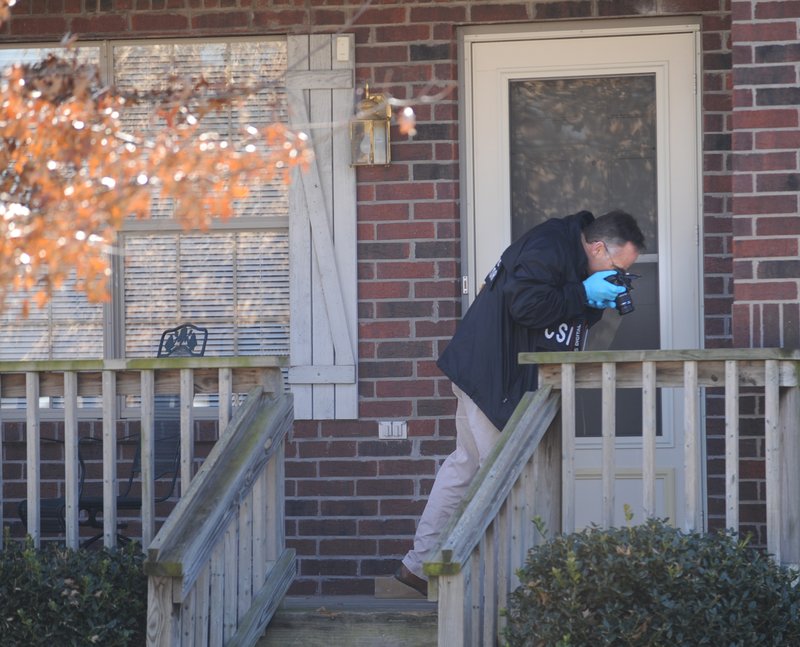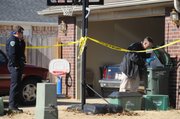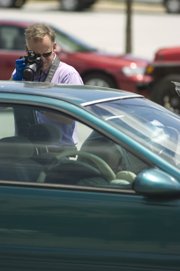FAYETTEVILLE -- Police are searching for two full-time crime scene technicians, splitting the work done by one man for 16 years.
John Brooks filled the position since the job's creation in 2001. He retired in May.
About the job
The full job requirements and application for crime scene technician can be found at http://www.fayettev…">www.fayetteville-ar… under the Jobs & Careers icon on the left. Anyone with questions regarding the position can call (479) 587-3520 and ask for a CID supervisor. Anyone with questions regarding the application process can call human resources at (479) 575-8278.
Source: Staff report
Investigations Capt. William Brown said the biggest reasons to split the position were the money could be found in the budget and to allow for on-call rotation, which Brooks said would give much-needed time off to the future technicians.
The job is a demanding one. Technicians are on call 24 hours a day, 365 days a year. It can be stressful, hectic and tiresome for one person, Chief Greg Tabor said.
Brooks went out to most unattended deaths, not just when foul play was suspected.
"The way I was taught is you go out on all of those so you know when you go to a crime scene, it's different. You can recognize foul play," Brooks said.
As the city grew, so did the number of calls Brooks had to go on.
"I always hoped that they would hire somebody," he said. "It became too much after 16 years. I couldn't go anywhere with my family. If we were going to Crystal Bridges, we'd have to take two cars, or my son and wife would have to understand that if I get a call, we have to go back to Fayetteville. And, if I'm going to be honest, you can only take seeing that kind of stuff for so long."
Brooks said he kept going because he believed he was helping people.
"My wife used to joke, 'If John was on the news it's not good.' It's true. But I always felt like I was helping people," Brooks said. "You have to be compassionate and have empathy. There are a lot of cases where I still see families or individuals that I helped on bad days. That kept me going. I had three capital murder cases in my career, and those never really go away. There are families I'll forever be tied to."
Crime scene technicians respond to all major crime scenes and assist detectives with searching, photographing, sketching, and collecting and transporting evidence. Afterward, they are in charge of packaging and sending evidence to the Arkansas State Crime Lab and monitoring databases for forensic test results.
The technician relieves many of the duties of crime scene processing so detectives can concentrate on other time-sensitive tasks such as interviewing witnesses, canvasing and tracking down suspects, Tabor and Brown said.
When a technician isn't working at the scene or with evidence, he's writing detailed reports, testifying in court cases as an expert witness, or training detectives and patrol officers on evidence recovery procedures.
Brooks never complained about the long hours and work, said Circuit Judge John Threet, who as the former prosecuting attorney worked closely with Brooks for many years.
Threet enjoyed working with Brooks throughout the investigation and trial process, he said, and also teased him about the van with a microscope on the side that he drove in the early days.
"Sometimes you're out there from 2 in the morning to whenever. It's real time-consuming. But he understood how important this stuff was. What we were doing out there was vital to the community," Threet said. "He was very careful and very thorough, and it was always good to have him there. In some cases, it was some poor, young kid that had been brutally murdered. I guess I'm trying to say that he's the type of guy you'd want in there if it was one of yours."
Two technicians would allow the department to split on-call duties or to investigate two crime scenes simultaneously. It also reduces the chance that a detective will have to cover the technician's duties, which happened on occasion when Brooks took vacations or was sick or at training.
Those who apply are required to have several specific certifications or be able to obtain them soon after being hired.
"It would be nice to get someone with a little bit of education and experience," Brown said. "It would be a quicker learning curve for someone like that."
The job goes beyond education and experience, police said.
"It absolutely takes someone a little bit special in that you are dealing with a very unpleasant work environment at times," Brown said. "It's not for everybody. You have to separate a little bit of personal feeling for work. It's not like seeing it on TV. You are seeing, smelling and touching this stuff."
Brooks was uniquely perfect for the job, said Lt. Tim Franklin, who has worked as a detective and a supervisor of the crime investigation division.
"His attention to detail and his methodical approach to crime scenes made him a successful investigator," Franklin said of Brooks.
Brown also pointed out Brooks' lasting influence on those he taught at the police academy and the University of Arkansas, Fayetteville, where he will continue to teach criminal investigation courses. Brooks said he now has his own business as a private investigator.
When Brooks retired, he was at the top of the position's pay range making $59,738 a year under the title senior crime scene technician.
Crime scene technicians in the Fayetteville Police Department are not officers. The new employees will make between $38,750 and $46,696 annually, said Tabor in a statement to the City Council. The council unanimously approved the positions July 18.
"There is sufficient turnover within the Police Department budget and the lowering of the salaries of these two positions to afford them this year," said Paul Becker, the mayor's chief financial officer.
The job opening was posted last weekend, and Brown said numerous applications are being reviewed. He said there is no set hiring deadline.
NW News on 08/26/2017


